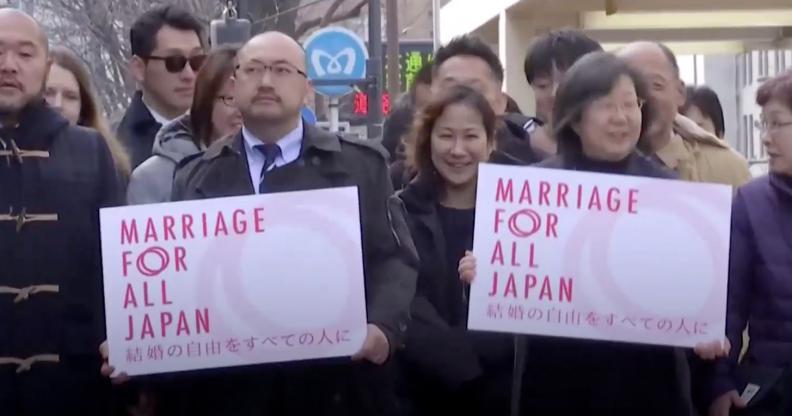Transgender man joins historic Valentine’s Day lawsuit to bring same-sex marriage to Japan

Campaigners for same-sex marriage in Japan (Screenshot: NBC)
A transgender man and his female partner have joined 13 other LGBT+ couples in filing the first lawsuit in Japan to challenge the country’s laws against same-sex marriage.
The case has been dubbed ‘the Valentine’s Day lawsuit‘ as it was filed on February 14 last year. The plaintiffs argue that current laws in Japan surrounding same-sex marriage violate their constitutional right to equality.
The transgender man, a company employee in his 40s in Tokyo, appeared at a news conference on February 13 with his partner, a woman who works as a public employee.
Japanese law requires transgender people to have gender confirmation surgery before they can change their gender in the family register. The man has not yet undergone the surgery so remains listed as female.
He and his partner have lived together for more than five years, but are unable to marry because they are legally considered a same-sex couple.
The woman, who is in her 40s, was previously married to a cisgender man. “I feel we are bound much more tightly [compared to the previous marriage] but we are not legally protected like a married couple,” she said at a press conference on Thursday.
“Is it that difficult [for the state] to accept us as a married couple, just like any other opposite-sex married couple?”
Takako Uesugi, a lawyer representing plaintiffs in the group lawsuits, said at the press conference that the state is making a “last-ditch argument” in continuing to deny same-sex marriages.
“We will counter their arguments theoretically,” she said.
Trans rights in Japan.
Compared to other Asian countries, Japan is relatively progressive when it comes to LGBT+ rights. However, transgender people face numerous obstacles, including being forced to be sterilised before they can legally change their gender.
They are also required to have “a body which appears to have parts that resemble the genital organs of those of the opposite gender”. The law has been condemned by the Human Rights Watch as “regressive and harmful“, but Japan’s Supreme Court voted to uphold it earlier this year.
Discrimination on the basis of gender identity is banned in certain Japanese cities, but gender identity is not protected by national civil rights laws.
A recent study found that 90 per cent of transgender jobseekers in Japan experience problems relating to their gender identity.

